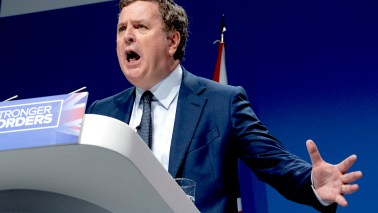It is difficult to describe with equanimity the culture shock that has been administered to Arts Council England, the 69 year-old benefits office for the creative industries.
Invented by Maynard Keynes to nurture the grass shoots of an English renaissance with a few quid here and there – £25,000 for Covent Garden, £2,000 for the LSO – ACE has burgeoned into a mighty quango that distributes £1.9 billion of public cash and £1.1 billion of lottery money over three years. It feeds not only the performing arts but museums, galleries, monuments, public libraries, poetry and pottery. It is a nanny state in miniature which, over the past generation, has become an executive arm of government policy in promoting multicultural equivalence, sexual equality, general dumbing down and political correctness at every turn of the wind. Its greatest triumph was the parading of a mechanical elephant through the streets of London at a cost of £1 million.
When Tony Blair came to power in 1997 he stacked the Arts Council with new Labour donors and flunkeys. His first chairman was the Irish entrepreneur Gerry Robinson, who had downgraded ITV’s content to a point of common idiocy and the company to near-ruin. The secretary-general, or chief executive, was Peter Hewitt, a Labour lackey from the North East who, having funnelled cash and angels to his home region, went on to run a London health charity, a quango man to his cuticles.
Hewitt was succeeded by Alan Davey, a senior civil servant at the Department of Culture Media and Sports, who, told he would rise no higher in Whitehall, was helped by his minister, James Purnell, into the Arts Council seat. The Keynsian arms-length principle went out of the window as Davey turned ACE into a New Labour rubber-stamp, aided and abetted by true-pink chairmen, Christopher Frayling and Liz Forgan.
If you are a Guardian-reading admirer of these various dignitaries, you may wish to put fingers in your ears for the next couple of paragraphs and go la-la-la very loudly. The facts of the matter are that over 17 years the ACE prattled New Labour mantras, declared that all shall have prizes and imposed such a heavy burden of bureaucracy on the arts that new companies sprung up swearing they were better off without state subsidy, so long as they didn’t have to fill another Britannica-sized form. Dame Liz, formerly a battler against Birtism at the BBC, was the Boadicea of this island empire, ably assisted by the admirable official, Alan Davey. Throughout her tenure, Dame Liz was chair of the Scott Trust, which owns the Guardian newspaper, which in turn rallied the luvvie classes in uncritical support for her arts regime.
The return of the Tories in a coalition government barely dented their hegemony. Jeremy Hunt, the first culture secretary, slashed the budget and ordered a reduction in the morbidly obese Arts Council head count. But so long as Forgan gave no trouble and Davey did as Whitehall wished Hunt pretty much ignored them. His parting shot was the appointment of a sworn crony and Tory donor to replace Dame Liz. Peter Bazalgette was the television entrepreneur who gave us Big Brother.
Bazza’s first act was to slash £5 million off the budget of English National Opera, where he had previously been an ineffectual chairman and for whose financial woes he was directly responsible. The Arts Council’s credit could hardly have sunk lower. Davey went off to run BBC Radio 3, at the invitation of his former minister James Purnell, now a key adviser to BBC DG Tony Hall. You may now unplug those ears.
This week, the Culture Secretary Sajid Javid, who has no form in the arts and no axes to grind, announced a new chief executive for the Arts Council. He could not be more different from the previous shower.
Darren Henley has been running a commercial radio station, Classic FM, since 1999. He loves classical music and keeps his eye on the ratings. If the audience tell him they don’t like squally voices, singing gets pushed back to the witching hours. All the while, however, Classic tries to push the envelope in different ways. I tend to bump into Henley in the lobby of the Liverpool Phil or the Sage. He has found a way of engaging regional orchestras that the BBC looks to only at Proms time. He has a passion for the lively arts and an urge to spread them far and wide. He has written reports for the coalition government on our massive failures in music education.
Henley is different from any Arts Council boss I have known over four decades. He was born in Tunbridge Wells, studied at the University of Hull and cut his radio teeth in the deadlands of Kent. He has no truck with metropolitan elites or on-message mantras. He will apply a sound business sense to the ACE structure and a shrewd eye for cost/benefit ratios to the priorities for subsidy.
Not a confrontational man, he has gushed praise for his predecessor and reassurance all round. But the moment he enters the ACE, the weather will change. No more love-ins with Guardianistas. No more cuddles with the BBC. There are tough choices to be made and a real chance to restore the Arts Council to core principles – to support the advancement of art, not the security of institutions. Go, Darren!






Comments